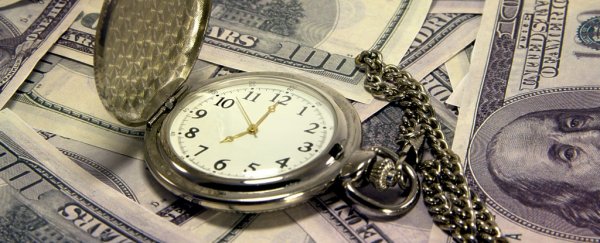Though money - or the lack thereof - is often cited as one of the most stress-inducing aspects of life, a new study has found that those who value time over money are generally happier compared to those who would rather amass more wealth.
These findings suggest that it doesn't really matter which of the two a person has more of - instead, it's all about a person's mentality toward the two, with the person who values their time more than their money being more likely be happier despite the amount of green in their wallets.
Researchers from the University of Pennsylvania and the University of California, Los Angeles (UCLA) asked more than 4,400 people a simple question – which would you rather have more of: time or money? The participants were then asked questions designed to gauge their level of happiness, reports Brian Resnick for Vox.
The team found that most people – 64 percent of those questioned – wanted more money, but those who wanted more time were generally happier. This suggests that it's not so much about what people have - it's about which one they want and, therefore, deem more important.
"What matters is the value people place on each resource," the team writes in the journal Social Psychological and Personality Science. "Beyond the amount of these resources people have, happiness is linked to the resource people want."
Interesingly, the team found that the demographics that wanted more time were different in many ways to those interesed in more money. On average, the older participants were, the more likely they were to favour time – which makes sense, seeing as they were more likely to have the ultimate time sap in their lives: kids.
Older participants were also more likely to work more, and therefore have more money, which could explain why they coveted free time more.
The Washington Posts' Christopher Ingraham brings up a great question about this point: "Could happiness be less a function of wanting time, and more a function of having money?" For the answer, he turned to one of the study's leaders, Hal Hershfield, from UCLA.
"By statistically controlling for already existing levels of wealth, we show that choosing time over money has a positive effect on happiness over and above wealth," Hershfield told Ingraham in an email.
This suggests that people, despite differences in income, are happier when they value time over money.
The new findings seem to back up a previous study from earlier this year that found similar results. David Nield reported for us back in January:
"Researchers from the University of British Columbia in Canada recruited more than 4,600 participants and found an almost even split between those who prioritised their time and those who prioritised their wealth, but the older participants were more likely to favour time over money. The team also found that those who put time first tended to be happier overall."
Similar results were found in the recent study, but were taken a step further to control for factors like age and wealth.
There's an important note that needs to be made here, though. The study doesn't mention whether or not they surveyed people living below the poverty line.
It stands to reason that a person struggling to pay for their basic living conditions – water, food, somewhere to sleep – would be tremendously happier with financial security than a bit more free time – a point that's backed up by another study from earlier this year that found a physical link between poverty and childhood depression.
So what's the takeaway here? The study suggests that if you want to become a happier person – and you already make enough money to provide the essentials – you should start placing more value on time because those who do are happier. After all, it's arguably much easier to control your spare time than it is your bank account.
